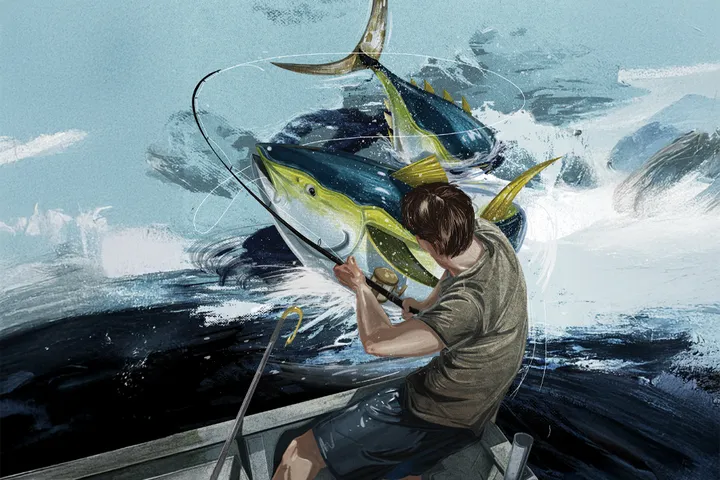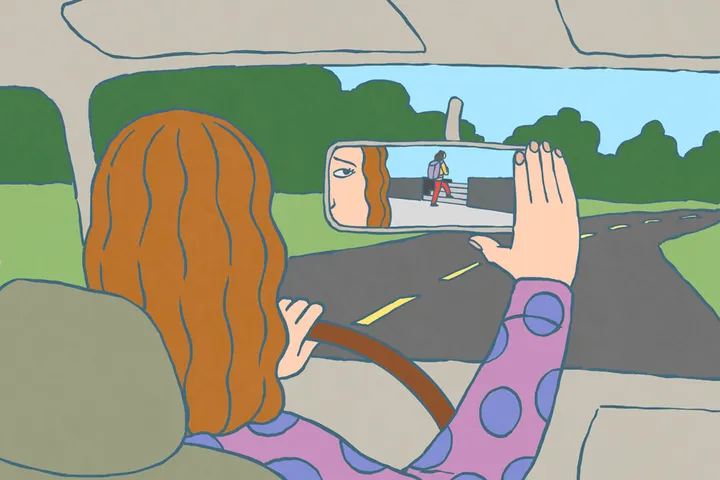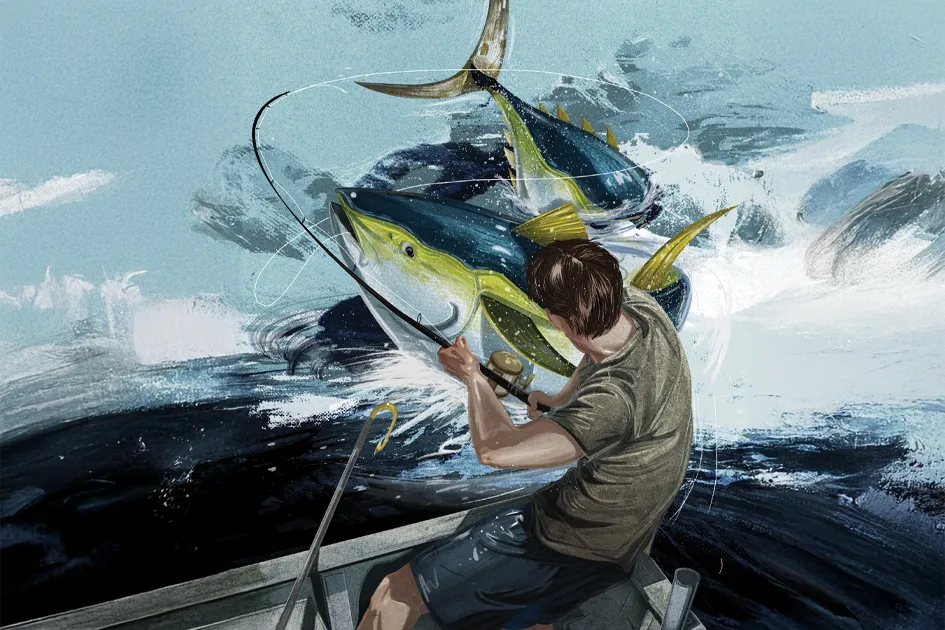My grandfather waited for me to finish moving all of my boxes into my new room. He poured me a glass of water and pulled another folding chair up to the blue square table in the living room of his dilapidated single-wide trailer. “Take a break,” he said, “You’ve been working hard unloading all of your stuff.” He pulled a deck of playing cards out and licked the tip of his thumb before flicking 10 cards my way, dealing a game of rummy. “Although, losing to me might wear you out even more.”
I took him up on his offer, slumping into the chair. As I wiped my brow with my shirt sleeve, I asked, “Papa Ben, when do you think we should head over to orientation?”

“You can just call me Benjamin from here on out,” he answered. “We’re classmates now.”
After serving in World War II and spending decades in the construction business, Benjamin—formerly known as Papa Ben—was finally pursuing higher education. Retirement didn’t suit him well, and after he lost his wife, it was difficult for him to be alone. He needed something to do. Auditing pastoral and biblical studies classes seemed to do the trick, and he was officially a college student for the first time at 76 years old.
On our first day of class, word had gotten around about Benjamin’s enrollment. Waves of double-takes filled the cafeteria as we were in line for food. A student in front of Benjamin turned and asked, “Hey, uh, are you a freshman here?”
Without missing a beat, Benjamin answered, “Yeah, but I look like a senior, don’t I?”
Benjamin and I had been close before living together. He constantly spoiled his grandchildren and erred on the side of fun rather than discipline. He would teach us new board and card games, and he always surprised us with Little Debbie snacks when our parents weren’t around. He made sure we were at the family reunion every year and provided us with enough water guns and sidewalk chalk to help us last the entire weekend.
On the surface, he was exactly what you’d expect a grandfather to be: a respected paternal figure, wiser and wizened by age, but loosened by it too. I had never pictured a scenario where he wasn’t sitting at a card table or telling stories from his service in the military. But now if I wasn’t observing Benjamin doing mundane tasks like chores or paying bills, I was running into him on campus.
One day during the fall semester, I was caught off guard by a knock at our door. I was even more surprised to find my estranged uncle David on the other side. Although he lived within the city limits, David only came out of hiding during particularly difficult times in his life.
He was officially a college student for the first time at 76 years old.
“Hey Tim,” I heard my grandfather say behind me, “David is going to be staying with us a few days if that’s okay.”
It was great to see family, and while David was around, we did everything we could to be a positive influence. But for him, we were only a brief respite before returning to his troubled and damaging life. Benjamin would skip classes and stay behind to try to encourage David. But nothing Benjamin did could pierce David’s calloused exterior, formed by years of fear and feeling unworthy of love or affection.
Over the next year, David would periodically stay over for a few days, lying on the couch during the day and sleeping on it at night, only getting up to make a sandwich or use the restroom. On the nights my uncle would leave, I would see Benjamin’s light on later than usual and I’d sit beside him on his bed. After a few minutes of silence, the light of the lamp deepening the darkness around us, his eyes would slowly redden with tears, and he’d whisper over and over, “I just don’t understand. I don’t understand.” Nothing could have prepared him for his prodigal son.
It’s natural for humans to define others by the labels we give them. At best, it’s a way to compartmentalize the myriad facts and information we take in every day. At worst, it’s a way to avoid the work of actually getting to know groups or individuals. We worship God best when we love each other well, and one of the best ways to love is to know each other well.
Until living with Benjamin, I never viewed him as a whole person. Part of this was simply adolescence and the slow realization that adults are people too. But another aspect was getting to know Benjamin beyond the war stories and anecdotes our occasional gatherings would provide time for. And that involved spending time with him and listening, picking up on nonverbal cues, knowing when to put an arm of comfort around him or be a shoulder of support.
His eyes would slowly redden with tears, and he’d whisper over and over, “I just don’t understand. I don’t understand.”
But what happens when the person’s not a loved one? It’s easy to shed the labels we place on family and friends. But what about those we don’t know or those we disagree with? It’s difficult enough to love our neighbors. What about Christ’s command for us to love individuals or groups we would believe to be our enemy?
One of Benjamin’s most fascinating stories from his service in World War II was actually from after the war had already ended. He was stationed in a military hospital in Germany, assigned to guard a high-ranking German officer who’d been injured and was on suicide watch.
As the hours of silence passed, Benjamin’s lack of sleep started getting the best of him. The warmth of the small room and his cozy chair provided a measure of comfort he had not experienced in a long time. Before he realized what was happening, everything slowly faded to black, and he was sound asleep.
The German soldier’s hand grabbed Benjamin’s shoulder, jolting him awake just as a senior officer entered the room and looked around. Benjamin noticed the captive flashing a faint but warm smile at him. They both knew if Benjamin had been found asleep on duty, he more than likely would have been thrown in jail.
They both knew if Benjamin had been found asleep on duty, he more than likely would have been thrown in jail.
From that moment on, he and the prisoner slowly developed a wordless camaraderie. Neither spoke the other’s language but were able to find subtle ways to greet each other. Benjamin would occasionally bring an extra snack and sit by the prisoner’s bed during his free time. Together they discovered an incredible truth: Sometimes, the more you get to know your enemy, the more you realize he isn’t really your enemy.
Life with Benjamin gradually became more difficult as the fall semester turned in to the spring. I found myself working more jobs throughout the week and becoming gradually more responsible for keeping up with tasks at home. When I worked late, Benjamin would stay up, unable to go to bed until he knew that I was home safe. While he grew increasingly in need of assistance from time to time, he was still determined to maintain his autonomy. After watching his wife slowly succumb to Alzheimer's disease a couple of years earlier, he did not want to admit that there were moments where he too needed to rely on the help of those around him.
One evening I arrived home to find Benjamin sitting in a chair near the kitchen. Beside him on the floor was a shattered glass of milk. Benjamin looked at me defeated and held up a rag. Reluctantly he murmured, “Could you help me with this?”
Without hesitation, I started wiping up the milk and picking up the larger shards of glass. Out of the corner of my eye I noticed Benjamin staring at the mess, his eyes welling with defiant tears.
Breaking the silence, he spoke. “I jumped out of planes. I used to build houses. I took care of Jane for all those years. Why is it so hard to clean up a simple mess?”
At that moment, there was little more I could do than listen—to be not just a grandson, or classmate, or roommate, or friend, but all of those rolled into one. Benjamin and I no longer saw each other in the limited roles we had previously given each other. Because of our newfound bond, we were able to address each other’s needs—even if that meant doing nothing at all but listening and understanding.
Together we sat in silence for a few minutes. Eventually, I interrupted the ticking clock and dripping milk. “Do you have time for a game of rummy?”
His eyes turned in my direction, and a grin crept on his face. “If you think you can handle it.”





